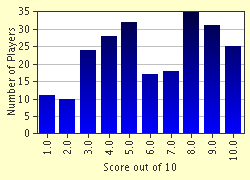Quiz Answer Key and Fun Facts
1. "Ennis" or "inish" means "island". Which of these island names means "the Big Island"?
2. "Kil" means "church" and there are plenty of churches in Ireland. Which of these placenames refers to a group of little churches?
3. "Knock" ("cnoc") is "hill" in Irish. "Knockalough" is a "hill near a lake". "Knockatober" is a "hill near a well". Which of the following coloured hills is a "red hill"?
4. "Dun" often occurs in combination with person's names such as in Dundonald, Duncannon ("Conan"), Dun Aengus (a Celtic God originally), Dundalk ("Dalgan"). It means the same as "Doon" in Doondonnell and in Lisdoonvarna. What is the nearest equivalent in English for "Dun" or "Doon"?
5. "Bally" (from "baile") is a "town". Which of these Bally-names means "black or dark town"?
6. "Clon" is a meadow. Which of these "Clon"-words refers to a "honey-meadow"?
7. Some Gaelic words can be understood in more than one way. A "curragh" as in the "Curragh" of Kildare can be a race-course. In some placenames "curragh" may mean marsh. Which of these "curragh"-names refers to a "yellow marsh"?
8. Some Gaelic words show clear links with other languages. Monasterboice is quite easy to understand as "Boethius' Monastery". Even Shan-kill ("old church") shows a clear link with Latin "senior", etc. Which of these names can be translated as: the church of the "monachoi" (Greek for "monks")?
9. To the observer who keeps an eye on Latin and Greek, one of these "Drum" ("ridge")-words should be identifiable as the "ridge of the cow(s)". Which one?
10. Some French and English names were adapted to Gaelic, often in a way which is hardly transparent to the non-Gael. Of which of these non-Gaelic girl's names might you find an adaptation in part of the placename "Cahersiveen"?
Source: Author
flem-ish
This quiz was reviewed by FunTrivia editor
Matve before going online.
Any errors found in FunTrivia content are routinely corrected through our feedback system.
